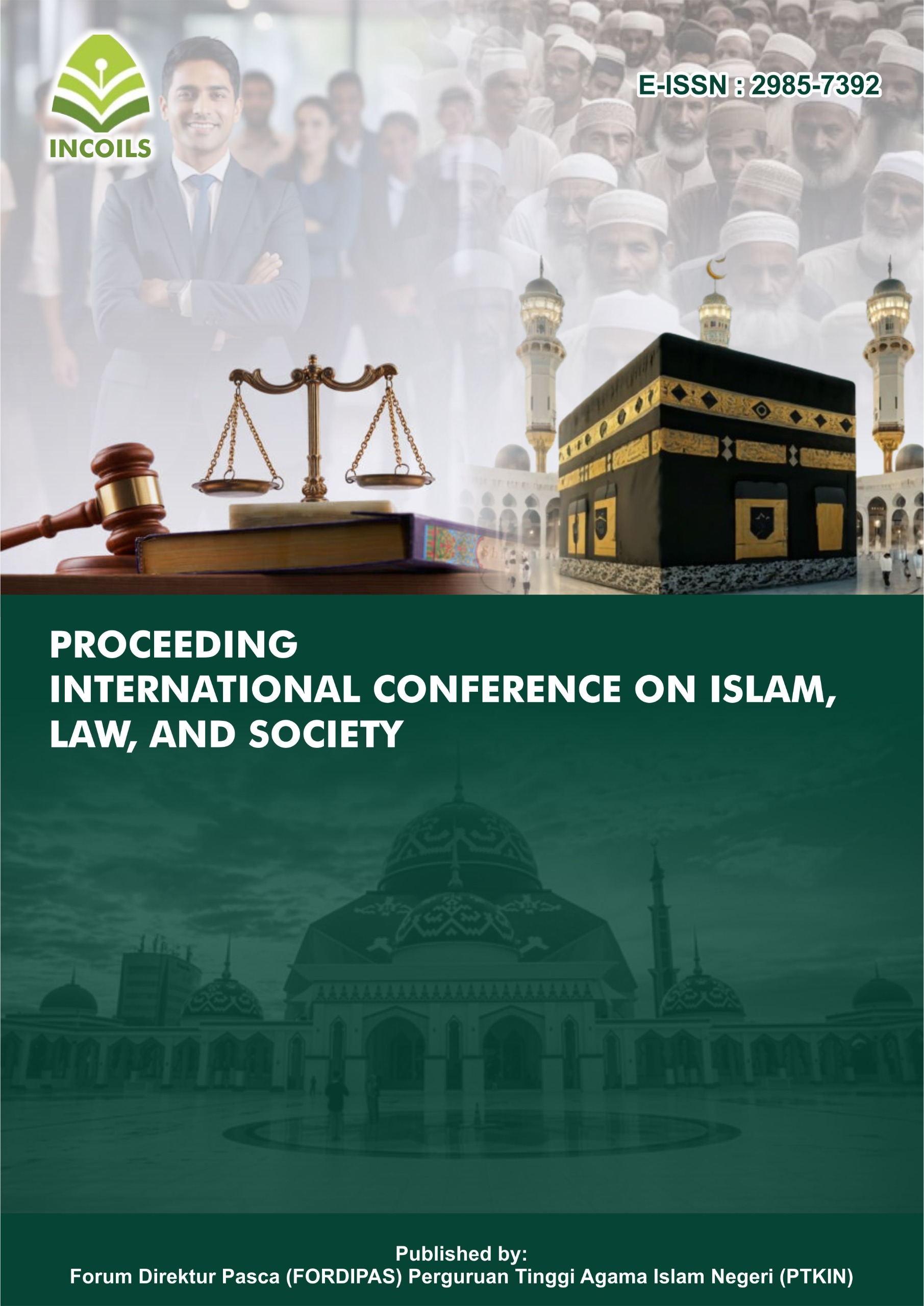Tradition of Li-Hifdz Al-Qur'an Prayer Practice (Living Qur'an at Bahrul Ulum Putri Kedungbajul Ngadisuko Durenan Trenggalek Islamic Boarding School)
DOI:
https://doi.org/10.70062/incoils.v3i1.165Keywords:
prayer li-hifdz al-Qur’an, living Qur'an, Karl MannheimAbstract
This article discusses the tradition of li-hifdz al-Qur'an prayer practice at Bahrul Ulum Putri Kedungbajul Ngadisuko Durenan Trenggalek Islamic Boarding School. This type of research is field research with a phenomenological approach and analyzed descriptively qualitatively. Data are obtained through observation, interviews, and documentation. The results showed that the implementation of the li-hifdz al-Qur'an prayer practice tradition was carried out after yasinan and diba'iyyah activities which were attended by 17 tahfidz students who had more than 10 juz. Four raka'at were performed with twice salutations, the first raka’at read Surat Yasin, the second raka’at Surat Ad-Dukhan, the third raka’at Surat As-Sajdah and the fourth raka’at Surat Al-Mulk, read jahr (aloud) and in congregation, then read istigfar 11 times and shalawat then closed with fatihah and prayer. The meanings contained in the tradition of the li-hifdz al-Qur'an prayer practice seen from the theory of sociology Karl Mannheim are: 1) objective meaning, the tradition is an obligation that must be carried out, because as a rule and practice diplomas from previous teachers. 2) expressive meaning, this tradition is interpreted as self-training to read the Qur'an in prayer and a means of maintaining memorization, also making more confident in the Qur'an, and facilitated in memorizing and being able to understand other sciences. 3) documentary meaning, the tradition is a practice that has become a routine so that it is accustomed to be carried out and becomes a custom for all members of the Islamic boarding school.
References
Al-Turmudzi, Abi Isa Muhammad bin Isa. Al-Jami’ Al-Kabir Sunan Turmudzi. 5th ed. Libanon: Dar Al-Gurab Al-Islami, 1996.
Amin, Muhammad. “Tradisi Mujahadah: Metode Menjaga Hafalan Al-Qur’an Di Pondok Pesantren Al-Ittifaqiah, Indralaya, Indonesia.” Jurnal Fuaduna 04, no. 01 (2020): 16.
Atabik, Ahmad. “The Living Qur’an: Potret Budaya Tahfiz Al-Qur’an Di Nusantara.” Jurnal Penelitian 8, no. 1 (2014): 165.
Baum, Gregory. Agama Dalam Bayang-Bayang Relativisme: Agama, Kebenaran Dan Sosiologi Pengetahuan. Edited by Achmad Murtajib Chaeri and Masyhuri Araow. Yogyakarta: Tiara Wacana Yogya, 1999.
Charisma, Nur Lailatul, Linandha Shinta Enjelita, Nurul Fahmi Mustafidah, Mutimmatul Hasanah, Ni’matul Mukaromah, and Muhammad Anwar Idris. “Praktik Salat Taqwiyatul Hifdzi Bagi Penghafal Al-Qur’an Di Pondok Pesantren An-Nur 1 Putri Malang.” Jurnal Al-Dzikra 16, no. 1 (2022).
Dhofeir, Zamakhsyari. Tradisi Pesantren Studi Pandangan Hidup Kyai Dan Visinya Mengenai Masa Depan Indonesia. Jakarta: LP3ES, 2011.
Fannani, Muhyar. Metode Studi Islam: Aplikasi Sosiologi Pengetahuan Sebagai Cara Pandang. Yogyakarta: Pustaka Pelajar, 2010.
Firlana, Amalia Rizky. “Amalan Shalat Hifzhil Qur’an Kajian Living Qur’an Di PPTQ Al-Hidayah Tulungagung.” Jurnal Hermeneutika: Ilmu Al-Qur’an dan Tafsir 13, no. 02 (2019).
Hafid, Abdul. “Tahfidz Al-Qur’an (Studi Living Qur’an Di Pondok Pesantren Al-Kamaliyyah Bogor).” Institut PTIQ Jakarta, 2022.
Luthfiyah, Siti Nur Azizatul, and M. Khoirul Hadi Al-Asy’ari. “Internalisasi Metode Hafalan Al-Qur’an Dalam Tradisi Salat Taqwiyah Al-Hifzh (Studi Living Hadits Di Pondok Pesantren Usyaqil Qur’an Talangsari Jember).” Jurnal Ilmiah: Ilmu Ushuluddin 18, no. 1 (2019).
Mannheim, Karl. Ideologi Dan Utopia. Edited by F. Budi Hardiman. Yogyakarta: Kanisius, 1991.
Mansur, M., Muhammad Chirzin, Muhammad Yusuf, Abdul Mustaqim, Suryadi, M. Alfatih Suryadilaga, and Nurun Najwah. Metodologi Penelitian Living Qur’an Dan Hadis. Yogyakarta: TH Press, 2007.
Putra, Heddy Shri Ahimsa. “The Living Al-Qur’an: Beberapa Perspektif Antropologi.” Jurnal Walisongo 20, no. 1 (2012): 271–304.
Sugiyono. Metode Penelitian Kuantitatif, Kualitatif, Dan R&D. Bandung: Alfabeta, 2018.
Sujarweni, V. Wiratna. Metodologi Penelitian Lengkap, Praktis, Dan Mudah Dipahami. Yogyakarta: Pustaka Baru, 2022.
Syamsuddin, Sahiron. Islam Tradisi Dan Peradaban. Yogyakarta: Bina Mulia Press, 2012.
Ulum, Bahrul. “Brosur Pendaftaran Pondok Pesantren Bahrul Ulum Tahun Ajaran 2023-2024.” @ppbahrululum_kedungbajul. https://www.instagram.com/p/Cla4sqFvaVo/?igshid=MzRlODBiNWFlZA==.
Interview with the Caretaker of the Bahrul Ulum Putra Islamic Boarding School, Agus Mochamad Hamam Nashiruddin, M. Ag, on March 2, 2023 at 20:00 WIB.
Interview with the Caretaker of the Bahrul Ulum Putra Islamic Boarding School, Agus Mochamad Hamam Nashiruddin, M. Ag, on March 14, 2023 at 20:30 WIB.
Interview with the Caretaker of the Bahrul Ulum Putra Islamic Boarding School, KH. Moh Ibnu Mukti, on February 4, 2023 at 19:30 WIB.
Interview with the Caretaker of the Bahrul Ulum Putri Islamic Boarding School, Ning Dewi Yukha Nida, S.Pd, on March 5, 2023 at 15:00 WIB.
Interview with the administrators of the Bahrul Ulum Putri Kedungbajul Islamic Boarding School, Lailatul Makhbubah, on March 10, 2023 at 14:30 WIB.
Interview with Tahfidz students at the Bahrul Ulum Putri Kedungbajul Islamic Boarding School, Aurelia Nadya Azmi, on March 11, 2023 at 16:00 WIB.
Interview with Tahfidz students at the Bahrul Ulum Putri Kedungbajul Islamic Boarding School, Nifa Zahrotus Syafa’ah and Ulil Hikmah, on March 11, 2023 at 14:00 WIB.
Interview with Tahfidz students at the Bahrul Ulum Putri Kedungbajul Islamic Boarding School, Nur Hamidatus Sufiyah, on March 11, 2023 at 14:00 WIB.
Interview with ustadzah of the Bahrul Ulum Putri Kedungbajul Islamic Boarding School, Arina Salsabila, on March 9, 2023 at 15:00 WIB.
Interview with ustadzah Zubaidatul Mardliyah, S. Pd. as well as the head of the Bahrul Ulum Putri Kedungbajul Islamic Boarding School, on March 8, 2023 at 15:00 WIB.
Downloads
Published
How to Cite
Issue
Section
License

This work is licensed under a Creative Commons Attribution-ShareAlike 4.0 International License.







